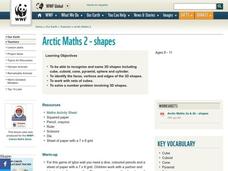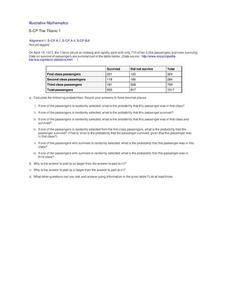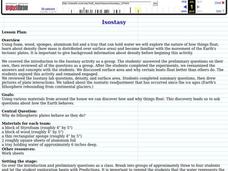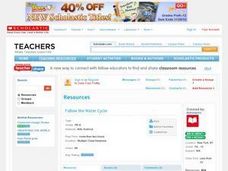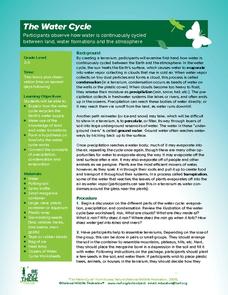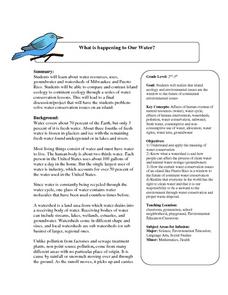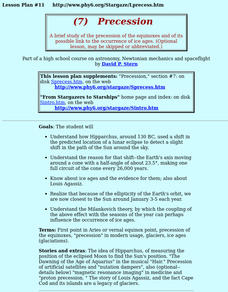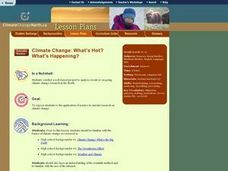Council for the Curriculum, Examinations and Assessment
Morals, Values and Beliefs
Your personality is based on the things you believe in, the morals you abide by, and the values upon which you make your decisions. Delve into a set of lessons about values and moral framework with your eighth graders as they explore and...
Space Awareness
The Big Meltdown
Explore the world (our world) of melting ice caps. Why are these caps melting? What is the effect of melting ice caps? Dive into the ever-present issue of global warming with a resource that has learners looking at data and participating...
World Wildlife Fund
Shapes
Investigate the properties of three-dimensional figures with this Arctic-themed math lesson. Beginning with a class discussion about different types of solid figures present in the classroom, young mathematicians are then given a...
World Wildlife Fund
Land of the Midnight Sun
From days of 24 hour sunlight, to endless nights that last for days, the Arctic is a very unique place to live. Examine the seasonal changes that occur in the northern-most reaches of the globe and the impact they have on the plants and...
Curated OER
The Titanic 1
Were your chances of surviving the sinking of the Titanic better if you were a first-class passenger? Capture learners' attention with actual historical data to find the answer. They use two-way tables to calculate conditional and...
NASA
Freshwater Availability Classroom Activity
This science assignment produced by NASA teaches inquiring minds the distribution of Earth's water. Learners will appreciate and understand the importance of fresh water and how weather and climate affects everything.
Compton Unified School District
How Can We Locate Places?
How can we locate places? Maps, of course! Expose second graders to the tools available in maps and discuss how these tools can help people find locations. Students also look at communities, including what makes a community and the...
It's About Time
How Might Global Warming Affect Your Community?
What effects will global warming have on your community? This last installment of a six-part series focuses on the effects that global warming may have on a community. Brainstorming and discussion allow groups to independently develop...
National Institute of Open Schooling
Water Pollution
Fifteen million children under the age of five die each year due to diseases in their drinking water. Water pollution is the topic of lesson 34 in the series of 36. Scholars, through reading and discussing, study numerous aspects of...
Montana State University
Climb into Action!
Climate change affects even the largest and intimidating of landforms—even Mount Everest! A resource helps teach learners the connection between global climate change and its effects on Earth. Activities include videos, class discussion,...
Curated OER
Poetry in Motion
Sixth graders answer questions about "From a Railway Carriage." They discuss different poetical forms. They work together to write a poem about travel.
Curated OER
Follow the Water Cycle
Students explore the stages in the water cycle, evaporation, condensation, and precipitation. They hypothesize about the source of rain and search for forms of water on Earth.
Curated OER
The Water Cycle
Students are introduced to the components and importance of the water cycle. They are shown how groundwater moves using a model. Students list 9 places on earth where water is found. They define the terms cycle and water cycle.
Curated OER
What is Happening to Our Water?
Students compare and contrast Wisconsin's water resources to that of Puerto Rico. They research books about islands, particularly the Puerto Rican islands. Student view illustrations of island ecology. They discuss the illustrations and...
Curated OER
Inquiring About the Titanic
Students observe pictures of the Titanic sailing and at the bottom of the ocean. They hypothesize the cause of the Titanic tragedy and engage in deeper questioning while one student writes responses on the board. They then work in groups...
Curated OER
Water Is Cool!
Students explore the importance of water. In this water lesson, students view a table to determine the amount of water found in the oceans, lakes, atmosphere, and streams. Students discuss ways to be a good steward of water.
Curated OER
Seasons
Young scholars name the 4 seasons, discussing the weather, plant life, animal life and and activities of each. Students read the book titled, "Hello Arctic," and and discuss changes in seasons that accompany the story. Young scholars...
Curated OER
Observing Sea Ice
Students study and observe types of sea ice found in Alaska. In this sea ice lesson, students use the student network for observing weather to study the different types of sea ice. Students study sea ice depicted in Alaskan art.
Curated OER
Precession
Students explain how Hipparchus, around 130 BC, used a shift in the predicted location of a lunar eclipse to detect a slight shift in the path of the Sun around the sky. They examine the elliptical orbit in which the Earth travels around...
Curated OER
Drop in the Bucket
Students study the sources for the water they use. They determine their town's major water supply and how many gallons per day does the population use.
Curated OER
Climate Change: What's Hot? What's Happening?
Students conduct a web-based project to analyze recent or on-going climate change research in the North. They are exposed to the application of science in current research on climate change.
Other popular searches
- Glaciers and Icebergs
- Models of Glaciers
- Water Science Glaciers
- Melting Glaciers
- Glaciers and Freshwater
- Michigan and Glaciers
- Wisconsin Glaciers
- Continental Glaciers
- Glaciers Lesson Plan
- Water +Science Glaciers
- Great Lakes Glaciers
- Ice Burgs and Glaciers




